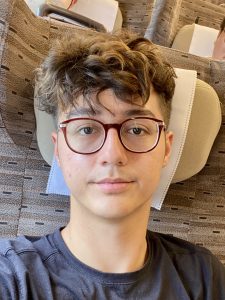AAYP 2018 Youth Ambassadors Scholarship

Alexander Radu
It was Chinese school on Saturday mornings, followed by an afternoon of Chinese calligraphy. Sundays usually involved early morning piano lessons and a variety of mathematical enigmas. There was swim practice after school on some days and afternoon chores on others. My childhood had pretty much been thought out, up until the last heartbeat. I was supposed to be that straight-A student, the one that my mother could eagerly brag about at her friends’ dinners. I was supposed to be a Mozart in the making, impressing the relatives with a different concerto every time they sojourned for the holidays. With a tiger mom, expectations were frequently met. Did I forget to mention she’s a doctor as well?
I’m always introduced into the conversation with “哇, 这是丁医生的儿子!” as if being born the son of a doctor is a grandiose accomplishment. Of course, there are perks of having a surgeon mother, the prominent one being able to receive medical advice instead of panic and tears when I get injured. However, I wanted people to recognize me for my achievements and garner my own respect. My parents have fulfilled a dream, immigrating to America as destitute, first-generation college students, in search for better opportunity and a greater future for me. Now, it was my turn to carry this burden of expectations and utilize it as inspiration when faced with challenging obstacles – especially in my everyday life as a student.
As I progressed through my middle school and high school years, I’ve devoted more and more attention to my Asian heritage. I started out as an ambivalent teenager, stuck on a bridge between Chinese culture and American culture. Attempting to conform to my colleagues, I allocated time to watching sports and replaced my lunches with fast food. Whenever I strolled too deep on the bridge to American culture, I found myself scurrying back, seeking refugee in my Chinese customs. I never seemed to understand the appeal of modern day football gladiators or the custom of deep frying all food in oil. American culture was simply unpalatable, until I found out it was more sophisticated than that.
In June of 2015, Mayor Bill de Blasio officially announced that New York City public schools would be in recess to honor the Lunar New Year. We were finally getting more adequate representation in American culture, a melting pot of many different ethnicities. My friends and I celebrated, far more than during any Super Bowl. In a public high school that’s predominantly Asian American, a leader needed to step up to remind everyone of their sacred roots – a role which I took upon myself.
My first efforts led me to creating a career-oriented club aimed at propelling Asian American influence to the forefront of various industries. In the status quo, the business, political, film, management, writing, and fashion industries are just a few that showcase a relatively low Asian population. By spearheading different forums on current events and discussing possibilities on ways to make a larger impact, I’ve not only been able to foster an underrepresented community, but also intrigue students of other backgrounds. Stuyvesant High School has always been a gateway for immigrants of many different nationalities to further their studies in the United States at a high academic rigor, especially for first-generation Asian Americans students. Through my club’s efforts, we’ve even promoted an English class titled Asian American Literature, dedicated to investigating the Asian American identity and culture through the lens of different authors – a class I eagerly experienced during my junior year.
I can vividly remember perusing through the pages of Chang-Rae Lee’s Native Speaker . This novel depicts a first-generation Korean American, Henry Park, attempting to cross the bridge from his Korean culture to American culture. Split between his work and family, Henry fails to cross and remains a man between two worlds – betraying both, belonging to neither. This storyline portrays just one of the many instances where an immigrant loses his or her identity trying to assimilate to American society. Forever an Asian American, I can sincerely empathize with the circumstances of Henry Park. In parallel, I feel that over the course of my life, I’ve played the role of a part-time spy, juggling the facets of two ethnicities – being both Asian and American. Both cultures entail their own disguises – with their own standards, mannerisms, and lifestyles.
However, while Henry Park’s internal conflict stems from his identity crisis, I’ve been able to use my dual ethnicities to my advantage. America is a nation of immigrants, making American culture a result of these immigrants’ backgrounds. When people ask me what’s my ethnicity, I proudly reply that I’m Chinese. I like to think of American culture as a melting pot – a way in which I can sample the many different customs of other nationalities. American values are not here to replace my Chinese background; instead, they’re here to expose me to the many other lifestyles out there.
When I counsel the many Asian immigrants who join my club and who take Stuyvesant High School’s signature Asian American Literature class, I make sure they remember one significant detail. Your parents have voyaged from their native countries so you can seek better opportunities and flourish in America – not so you can blend in with the crowd or “fit-in”. Your families each carry a unique array of customs, rituals, and traditions. So, when an ignoramus calls you out for having a name resembling onomatopoeia, just know that there are millions of others just like you in America, and that he’s the one with the foreign background.
